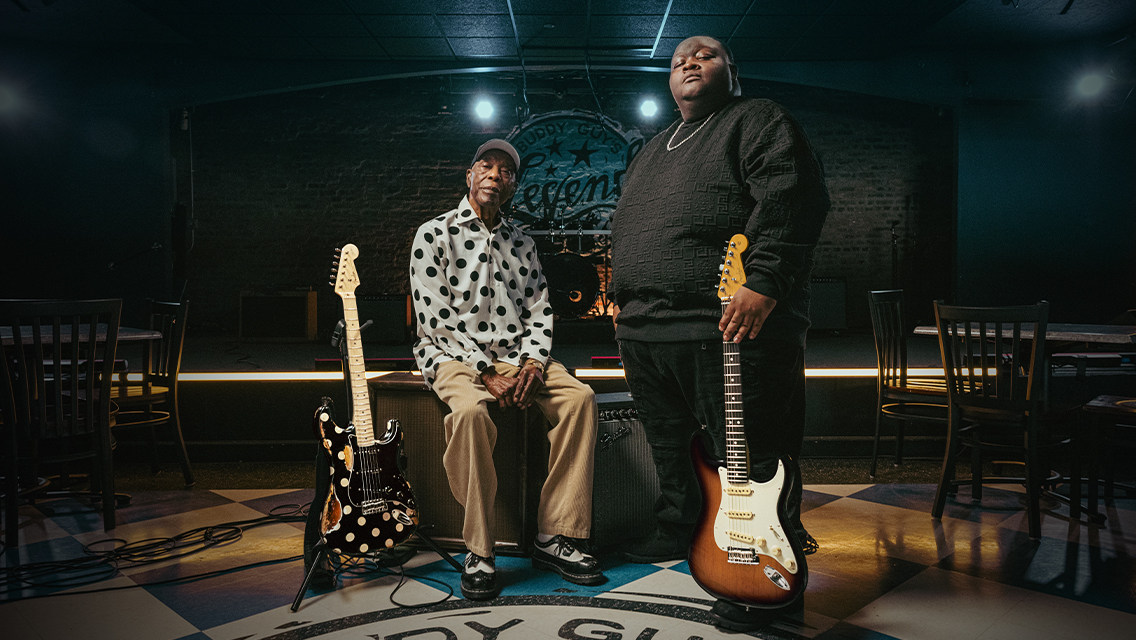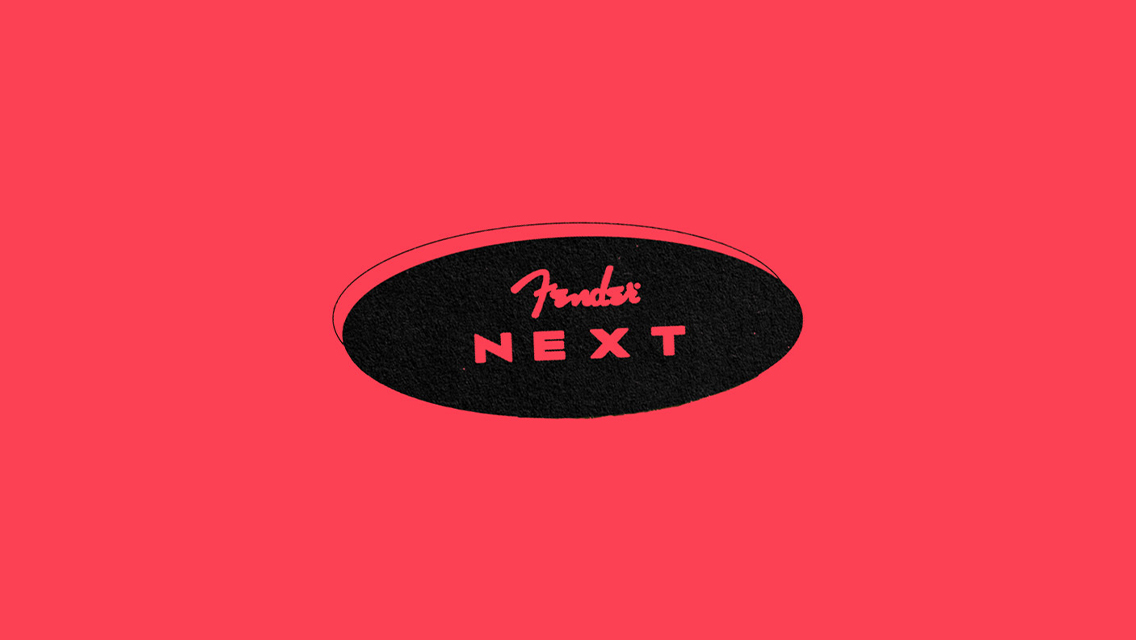4 Min ReadBy Mike Duffy
Greta Van Fleet on Their Influences and the 'Primal' Nature of Instruments
Jake and Sam Kiszka of Greta Van Fleet discuss the importance of connecting with the audience and how a broken arm helped Jake become a better player.

Sections
In a relatively short period of time, Greta Van Fleet has staked a firm claim on the mantle of the hottest rising band in the world.
Endorsements from luminaries like Slash, Justin Bieber, Elton John and Tom Hanks (!), posh billings at several major music festivals and a sold-out headlining tour across North America and Europe have certainly made 2018 a heady year for the young quartet out of Frankenmuth, Mich.
Not too bad for a group that hasn't released a full-length album yet.
But Greta Van Fleet - made up of 22-year-old twins Josh and guitarist Jake Kiszka and 19-year-old bassist/keyboardist Sam Kiszka, plus drummer Danny Wagner, also 19 - have earned the accolades honestly. With relentless riffs, a pummeling rhythm section and a singer born to wail, Greta Van Fleet is proudly and refreshingly carrying the banner of bluesy, arena-ready rock and roll.
The brothers were raised to have an appreciation of classic rock, soul and blues from their encouraging parents, essentially eschewing modern "pop" music until middle school. Those influences ride heavy throughout the band's first two EPs, Black Smoke Rising and From the Fires, which earned them two No. 1 singles on Billboard's Mainstream Rock charts ("Highway Tune" and "Safari Song").
Greta Van Fleet's ferocious live shows, where their vintage clothes and reliance on their instruments (no samplers in sight) speak to the band's throwback vibe, have only added to the lore and boosted insatiable interest in an upcoming debut LP.
"The double EP is kind of an island, as far as what we want to do," said Jake Kiszka. "The full album is really exciting. We really stretched our arms on this one, took some more creative liberties. I don't think we're afraid of the reception."
In the midst of the whirlwind surrounding Greta Van Fleet, Fender.com spoke with Jake and Sam Kiszka about their influences, why playing live instruments is more important than ever and how a broken arm helped Jake become a better guitarist.
Jake: "I was playing guitar since I can remember. It's almost like a language, something you grow up just knowing."
"My dad was mainly a blues harmonica player, but he was into guitar, too. He'd leave them on the ground, and I'd crawl around and play with them. My mom would tell him to pick them up so we wouldn't break them, but he thought we would just get sick of them. I never did. It was a fascination. The mystery of it."
Sam: "The first song I ever wanted to learn was 'I Heard It Through the Grapevine,' which is still one of the best basslines of all time."
"I actually didn't pick up the bass until I was 12 or 13. That was because my dad would always bring back buddies from jazz bands, like drummers. He and Josh would sometimes go out there and sing, and my mom started telling me that I looked like a bass player … probably because she saw an opportunity for me to do something with a band. Whatever that means. My dad had a little Fernandes P Bass lying around, so I just started messing around with it."
Jake: "I had to learn a certain number of songs before my dad knew I was worthy of possessing an actual electric guitar."
"I played on this little acoustic that I grew up with forever. I got to learn a handful of Hendrix songs and a Bob Seger song, Gordon Lightfoot and some (Bob)Dylan tunes before I could upgrade. I was like 10 or so. If you think about it, it was intentional. It's the subtlety of how to go about really learning how to play. Now, I think that if I had gotten an electric guitar back then, I'd have just cranked the gain all the way up and beat the hell out of it. There would have been no subtlety to it."
Jake: "It seems like the acoustic guitar is the most primitive thing."
"It's made of wood, it's strung with steel. That's how most blues guitarists started out. Seeing as how my father was a blues musician and had a respect for it, he really wanted me to learn from that. We listened to old blues records, like Robert Johnson and Big Bill Broonzy, stuff like that. I'd just try to emulate what they were doing on the acoustic using my fingers, not with a pick. I learned arpeggios at a young age and all the plucking that Dylan and Joan Baez did. Those lessons made me a better guitarist."
Sam: "I actually learned how to play rock bass from Jack Bruce."
"Figuring out bass fills was an early challenge for me. A lot of people just rely on the chord progressions, but you've got guys like John Entwistle, James Jamerson and Jack Bruce doing that kind of stuff in between playing the actual part, being creative in the space, I learned that after about a year of playing. Really simple stuff. 'Oh, you can play this between notes? You can climb this way?' Maintaining the flow of the song but doing something a little more out of the box is important as a bass player."
Jake: "Growing up, there's a certain point where you hit a wall and you don't think you're getting any better. You are, but you don't know it because you're not making drastic improvements."
"The point where I decided I needed to learn how to solo, where I wanted to show my voice in my licks, to speak that language, my dialect. That was a challenge I gave myself. I studied a lot at that point, especially Eric Clapton. As soon as I figured out what it was that I wanted to do, the whole world exploded. The floodgates opened, and I found my own approach to it."
Jake: "Playing stripped-down really reveals the essence of who you are as a musician."
"I run out of something very direct. Just the guitar with some PAFs (pickups)our of the guitar I'm using. Maybe just minimal pedals. I pride myself on the ability to utilize pedals to substantiate my ability to play. Whatever I'm coming out of, it's to respect the quality of the guitar I'm playing. A lot of that technique is from necessity, going through a guitar and an amp. It's very primal. It's coming from your heart and soul to your fingers to the audience."
Sam: "One thing that people have been doing for centuries and centuries is having the utility, the tool. That's what's important about instruments."
"We're creatures of evolution and instinct. We pick up steel and wood and learned how to use it. That's how music evolved. But there's nothing more direct - and it doesn't necessarily have to be stringed instrument - but that language is still important. Those are things, especially in our generation, bring us closer together. The fact that you can't manufacture it. It has to be authentic, from your soul through those strings out to those people. I think with a computer, there's the possibility to lose that element."
Jake: "I broke my arm wrestling around the eighth grade, and I was definitely scared I would never play again."
"There's a plate in there. I got surgery about three days after I broke it and had a cast for about six months. I would go down in the basement and tryto play, and I went to my dad's shed and sanded off the underside of the hand but kept the back of the cast on. My doctor said it would help strengthen the muscles. They let me keep the cast that way and by the end of the surgery, when they took off the cast, I gained an entire fret (Editor's note: At this point, Jake displays the extended range between his thumb and pinkie finger). So, the moral of the story is if you want to gain another fret, break your arm."
Jake: "I never thought I could play bass. Somebody pushed me into it, and everybody should just give it a try."
"For all the parents out there, if they want their children to appreciate music, they should have instruments around the house. Everyone can play music. You just have to go for it."
For more from Greta Van Fleet, including tour dates, visit their official website.
Don’t miss out!
Be the first to know about new products, featured content, exclusive offers and giveaways.


